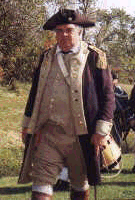 Re-enactment of the
Battle of Saratoga
Re-enactment of the
Battle of Saratoga
 Benjamin Lincoln was from central Massachusetts, and was one of the two Major
Generals from that colony. He started out with no military experience
and yet came to be second in command of the continental army.
The commander of Major General Benjamin Lincoln was Benedict Arnold.
During the first battle in Saratoga, Major General Schuyler was in command.
Benjamin Lincoln was from central Massachusetts, and was one of the two Major
Generals from that colony. He started out with no military experience
and yet came to be second in command of the continental army.
The commander of Major General Benjamin Lincoln was Benedict Arnold.
During the first battle in Saratoga, Major General Schuyler was in command.Major General Lincoln felt that the war was worthwhile because individuals couldn't own property in Europe at that time. A person's occupation was preordained, and the King held too much power over the people. In America, there were huge tracts of land for the taking. No lords existed to stifle ownership, which was very revolutionary in the colonial time period.
America was based on the purest form of democracy, according to Major General Lincoln. There was representative government in which the individual, rather than the state or the aristocracy, had the greatest say. Also, this was the first time a rebellion against an established state succeeded.
The American army faced many obstacles on their road to freedom. Lack of supplies, uniforms, food, and munitions were all problems. The divisions between men of various colonies hindered their efforts, as well. There was a lack of cohesion amongst the officers, because then, as now, mens' egos got in the way. The American wilderness hampered war efforts, too, since there were no easy supply routes. The medicine of the period was very primitive, since even those in the medical profession had no concept of infection or cleanliness. There were few medications available, causing some of the most basic illnesses to be fatal.
Pay was intermittent at best. A few men came in with small fortunes and
spent them on clothing and food for the troops, and occasionally ended up bankrupt.
The money the soldiers were supposed to be paid, which wasn't much to
begin with,
was often used instead to feed and clothe the men. Congress set aside lands
as payment, and each man was promised a tract of land (about six hundred acres)
for his service. Most soldiers, however, received only one hundred fifty
acres of the land promised to them.
Land speculators, looking to profit, bought up the claims.
Since the men coming out of the Continental Army needed money
immediately to feed and clothe their families, they sold their
land to the speculators.
